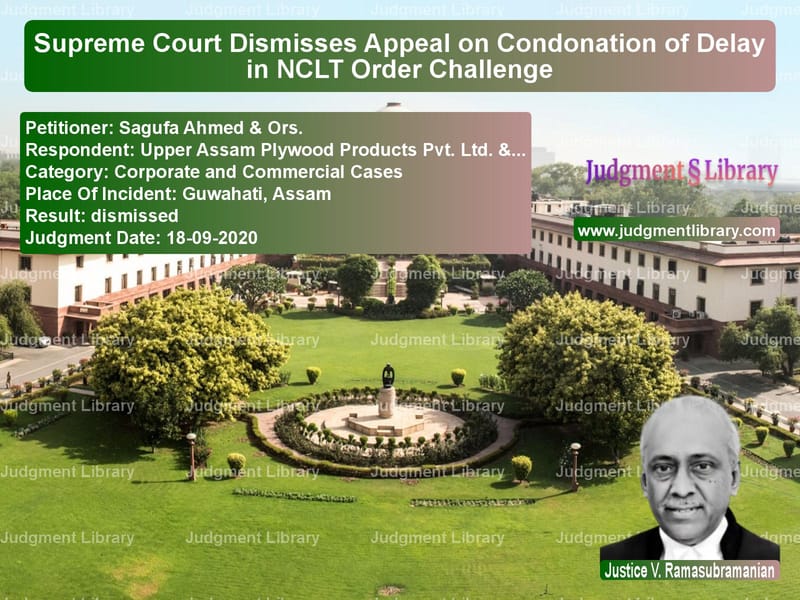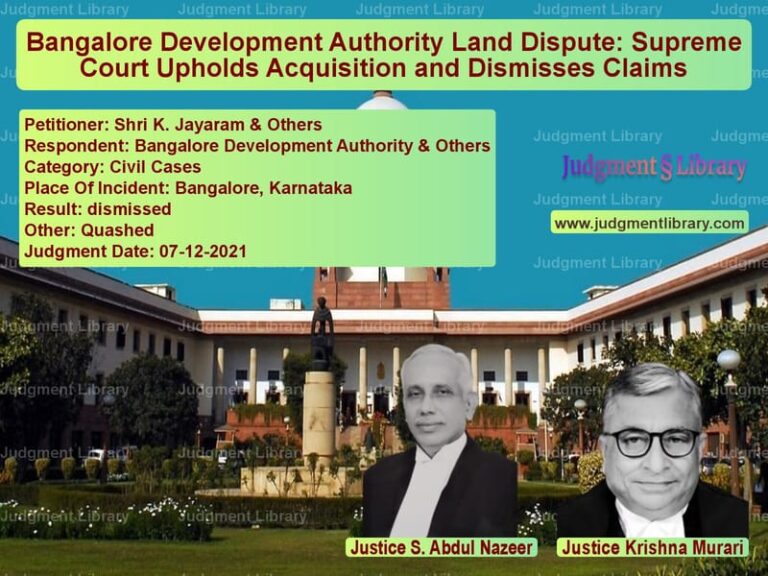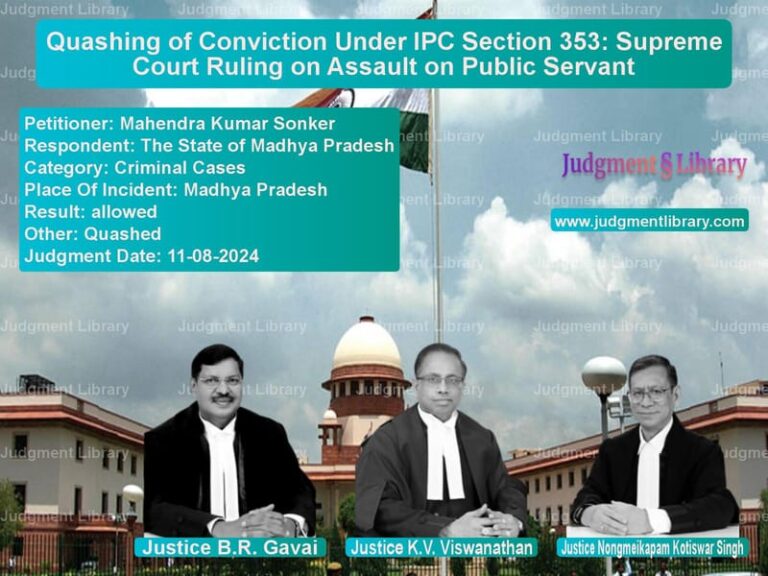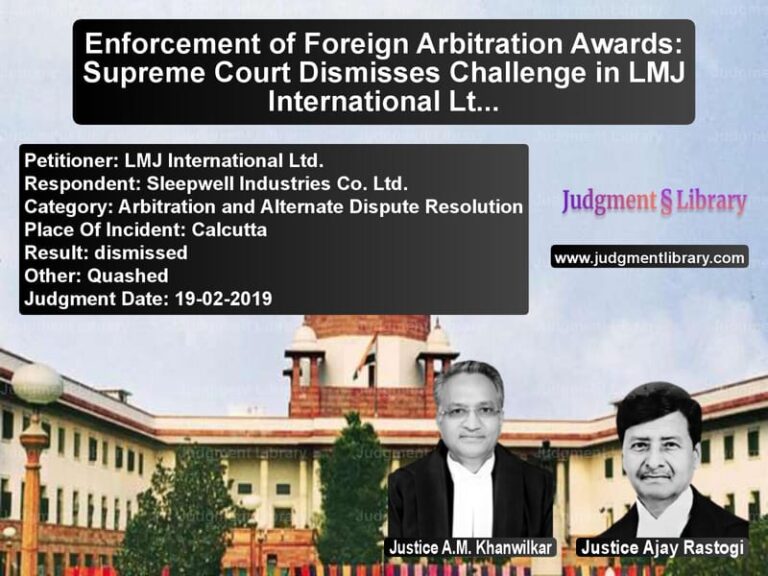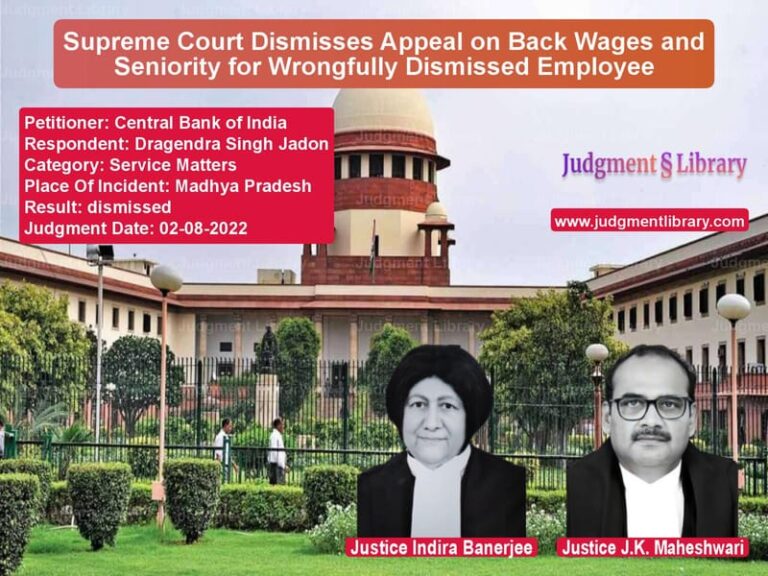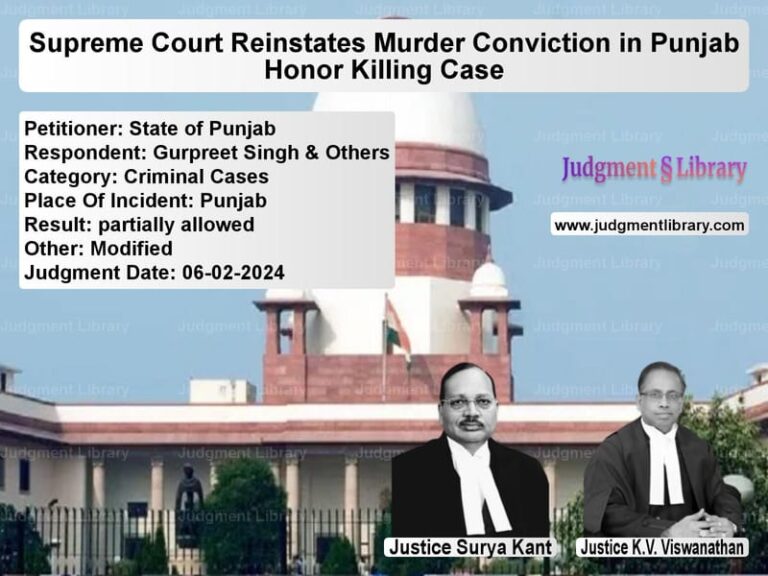Supreme Court Dismisses Appeal on Condonation of Delay in NCLT Order Challenge
The Supreme Court of India, in the case of Sagufa Ahmed & Ors. vs. Upper Assam Plywood Products Pvt. Ltd. & Ors., delivered a critical ruling regarding the applicability of limitation periods in appeals under the Companies Act, 2013. The case centered on whether the extension of limitation periods due to the COVID-19 pandemic applied to cases where the statutory appeal period had already lapsed.
The Court ruled that the extension granted in Suo Motu Writ Petition (Civil) No.3 of 2020 by the Supreme Court applied only to the prescribed period of limitation and not to discretionary extensions granted under statutes.
Background of the Case
The appellants, Sagufa Ahmed and others, were minority shareholders holding 24.89% of shares in Upper Assam Plywood Products Pvt. Ltd.. They filed a winding-up petition before the National Company Law Tribunal (NCLT), Guwahati Bench, which was dismissed on October 25, 2019.
Following this, the appellants applied for a certified copy of the NCLT order on November 21, 2019 (though records suggested it was actually November 22, 2019). The certified copy was received on December 19, 2019, and the 45-day appeal period, under Section 421(3) of the Companies Act, 2013, expired on February 2, 2020. An additional discretionary extension of 45 days could have been sought until March 18, 2020, but the appeal was filed only on July 20, 2020.
Legal Issues and Arguments
The key legal issues before the Supreme Court were:
- Whether the limitation period for appeal should be computed from the date of the NCLT order or the date of receiving the certified copy.
- Whether the Suo Motu extension granted by the Supreme Court due to the COVID-19 pandemic applied to cases where the discretionary extension had already expired.
- Whether the NCLAT was justified in dismissing the appeal as time-barred.
Arguments by the Appellants
The appellants, represented by Senior Counsel, argued:
- The limitation period should be computed from the date of receiving the certified copy, i.e., December 19, 2019, rather than from the date of the NCLT order.
- The period of limitation expired on March 18, 2020, just before the national lockdown due to COVID-19.
- The Supreme Court’s order in Suo Motu Writ Petition (Civil) No.3 of 2020 extended all limitation periods starting from March 15, 2020, thus covering their delay.
Arguments by the Respondents
The respondents, represented by Senior Counsel, countered:
- The appellants failed to file the appeal within the prescribed period, including the discretionary extension granted under Section 421(3).
- The Supreme Court’s suo motu extension applied only to the limitation period and not to discretionary condonations of delay.
- The delay in applying for the certified copy of the order showed a lack of diligence on the appellants’ part.
Supreme Court’s Ruling
On Computation of Limitation
The Supreme Court clarified that:
- Under Section 421(3) of the Companies Act, 2013, the limitation period of 45 days starts from the date the order is “made available” to the aggrieved party.
- Since the certified copy was received on December 19, 2019, the appeal period expired on February 2, 2020.
- The discretionary extension period (45 days) expired on March 18, 2020, and the appellants failed to file the appeal within this period.
On Applicability of the COVID-19 Suo Motu Extension
The Court ruled that:
- The suo motu extension applied only to the prescribed period of limitation, not to discretionary extensions granted under statutes.
- The limitation period had already expired on March 18, 2020, before the lockdown was imposed.
- The appellants could not claim relief under the Supreme Court’s extension order since they had already exhausted their statutory extension.
On Dismissal of the Appeal
The Supreme Court upheld the NCLAT’s decision, ruling that:
- The appellants failed to act diligently in filing their appeal.
- There was no scope for condoning delay beyond the statutory limit of 45+45 days.
- The Supreme Court’s suo motu extension could not be used to revive expired statutory periods.
Legal Principles Established
This ruling reinforces several key legal principles:
- Strict Interpretation of Limitation Periods: The statutory appeal period must be adhered to, and delays cannot be condoned beyond prescribed limits.
- Scope of Suo Motu Extensions: The COVID-19 extension granted by the Supreme Court applied only to prescribed limitation periods, not to discretionary extensions.
- Litigants’ Duty of Diligence: Parties must act promptly and not rely on discretionary relief unless justified.
Conclusion
The Supreme Court’s decision in Sagufa Ahmed & Ors. vs. Upper Assam Plywood Products Pvt. Ltd. & Ors. clarifies the strict application of limitation laws in corporate disputes. By rejecting the appellants’ plea for an extended deadline under the COVID-19 relaxation order, the Court reinforced the importance of timely filing and diligence in legal proceedings.
This ruling serves as a guiding precedent for corporate litigants, ensuring that statutory time limits in appellate proceedings under the Companies Act, 2013, are strictly enforced.
Petitioner Name: Sagufa Ahmed & Ors..Respondent Name: Upper Assam Plywood Products Pvt. Ltd. & Ors..Judgment By: Justice V. Ramasubramanian.Place Of Incident: Guwahati, Assam.Judgment Date: 18-09-2020.
Don’t miss out on the full details! Download the complete judgment in PDF format below and gain valuable insights instantly!
Download Judgment: Sagufa Ahmed & Ors. vs Upper Assam Plywood Supreme Court of India Judgment Dated 18-09-2020.pdf
Direct Downlaod Judgment: Direct downlaod this Judgment
See all petitions in Company Law
See all petitions in Corporate Compliance
See all petitions in unfair trade practices
See all petitions in Bankruptcy and Insolvency
See all petitions in Public Interest Litigation
See all petitions in Judgment by V. Ramasubramanian
See all petitions in dismissed
See all petitions in supreme court of India judgments September 2020
See all petitions in 2020 judgments
See all posts in Corporate and Commercial Cases Category
See all allowed petitions in Corporate and Commercial Cases Category
See all Dismissed petitions in Corporate and Commercial Cases Category
See all partially allowed petitions in Corporate and Commercial Cases Category

